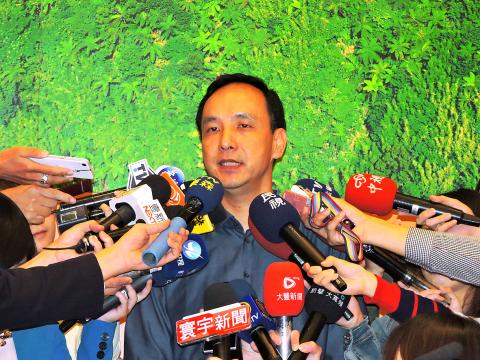Chinese Nationalist Party (KMT) Chairman Eric Chu (朱立倫) yesterday said that when he talked about “one China” during his meeting with Chinese President Xi Jinping (習近平), he was referring to the Republic of China (ROC).
Chu has been criticized over his opening remarks in a meeting with Xi in Beijing on Monday, in which he described the so-called “1992 consensus” by saying that both sides “belong to one China, but with each side ascribing different contents and definitions to the concept of ‘one China.’”
Taiwanese opposition parties accused Chu of making concessions on national sovereignty by recasting the “1992 consensus” under Beijing’s “one China” framework.

Photo: Lai Hsiao-tung, Taipei Times
Chu, who returned to Taiwan early yesterday after a three-day visit to China, said that his phrase “belong to one China,” according to the ROC Constitution, meant “belong to the ROC” — with each side ascribing a different content and definition to “one China.”
Chu added that during his meeting with Xi, he mentioned Taiwan’s history over the past century, as a way to help Beijing understand the existence of different voices in Taiwan and the importance of the two sides agreeing to disagree.
Chu also said the KMT has “expressed a stern protest against and demanded the retraction of” a report by The Associated Press (AP) that said Chu “reaffirmed the party’s support for eventual unification with the mainland” when meeting Xi.
In the article, which AP ran under the headline: “In China, Taiwan party leader calls for more global access,” Chu was reported to have “affirmed his party’s support for eventual unification with the mainland,” according to the KMT.
The report has been widely cited by local media outlets.
In response to reporters’ questions about the AP report, Chu said a protest had been filed with the news agency and a retraction demanded.
“There is no need for some media to maliciously distort or interpret [the meeting or the report] out of context,” Chu said. “We do not have to be trapped by the 1992 consensus, but can look for regional economic cooperation and participation in international organizations, and emphasize how to empower our young people and support small and medium-sized enterprises.”
Late on Monday night, the KMT released a brief statement accusing AP reporter Christopher Bodeen of having made a “serious mistake” in reporting that Chu “reaffirmed his support for eventual unification with the mainland.”
KMT spokesperson Yang Wei-chung (楊偉中) called the report “illusory and inconsistent with the facts,” saying that Chu has “never held such a view and did not talk about issues of unification during the mainland visit.”
The party released another statement yesterday morning asking local media outlets “not to misquote” the article because the AP has since retracted “the report with incorrect content.”
KMT spokesperson Lin Yi-hua (林奕華) said that Bodeen had edited the article, removing the remarks that asserted Chu had reaffirmed his support for an eventual union with China.
The edited report said that Chu affirmed his party’s support for “a consensus reached between Chinese and Taiwanese negotiators in 1992 that is interpreted by Beijing as a commitment to an eventual unification,” the KMT said.

A Ministry of Foreign Affairs official yesterday said that a delegation that visited China for an APEC meeting did not receive any kind of treatment that downgraded Taiwan’s sovereignty. Department of International Organizations Director-General Jonathan Sun (孫儉元) said that he and a group of ministry officials visited Shenzhen, China, to attend the APEC Informal Senior Officials’ Meeting last month. The trip went “smoothly and safely” for all Taiwanese delegates, as the Chinese side arranged the trip in accordance with long-standing practices, Sun said at the ministry’s weekly briefing. The Taiwanese group did not encounter any political suppression, he said. Sun made the remarks when

PREPAREDNESS: Given the difficulty of importing ammunition during wartime, the Ministry of National Defense said it would prioritize ‘coproduction’ partnerships A newly formed unit of the Marine Corps tasked with land-based security operations has recently replaced its aging, domestically produced rifles with more advanced, US-made M4A1 rifles, a source said yesterday. The unnamed source familiar with the matter said the First Security Battalion of the Marine Corps’ Air Defense and Base Guard Group has replaced its older T65K2 rifles, which have been in service since the late 1980s, with the newly received M4A1s. The source did not say exactly when the upgrade took place or how many M4A1s were issued to the battalion. The confirmation came after Chinese-language media reported

The Taiwanese passport ranked 33rd in a global listing of passports by convenience this month, rising three places from last month’s ranking, but matching its position in January last year. The Henley Passport Index, an international ranking of passports by the number of designations its holder can travel to without a visa, showed that the Taiwan passport enables holders to travel to 139 countries and territories without a visa. Singapore’s passport was ranked the most powerful with visa-free access to 192 destinations out of 227, according to the index published on Tuesday by UK-based migration investment consultancy firm Henley and Partners. Japan’s and

BROAD AGREEMENT: The two are nearing a trade deal to reduce Taiwan’s tariff to 15% and a commitment for TSMC to build five more fabs, a ‘New York Times’ report said Taiwan and the US have reached a broad consensus on a trade deal, the Executive Yuan’s Office of Trade Negotiations said yesterday, after a report said that Washington is set to reduce Taiwan’s tariff rate to 15 percent. The New York Times on Monday reported that the two nations are nearing a trade deal to reduce Taiwan’s tariff rate to 15 percent and commit Taiwan Semiconductor Manufacturing Co (TSMC, 台積電) to building at least five more facilities in the US. “The agreement, which has been under negotiation for months, is being legally scrubbed and could be announced this month,” the paper said,